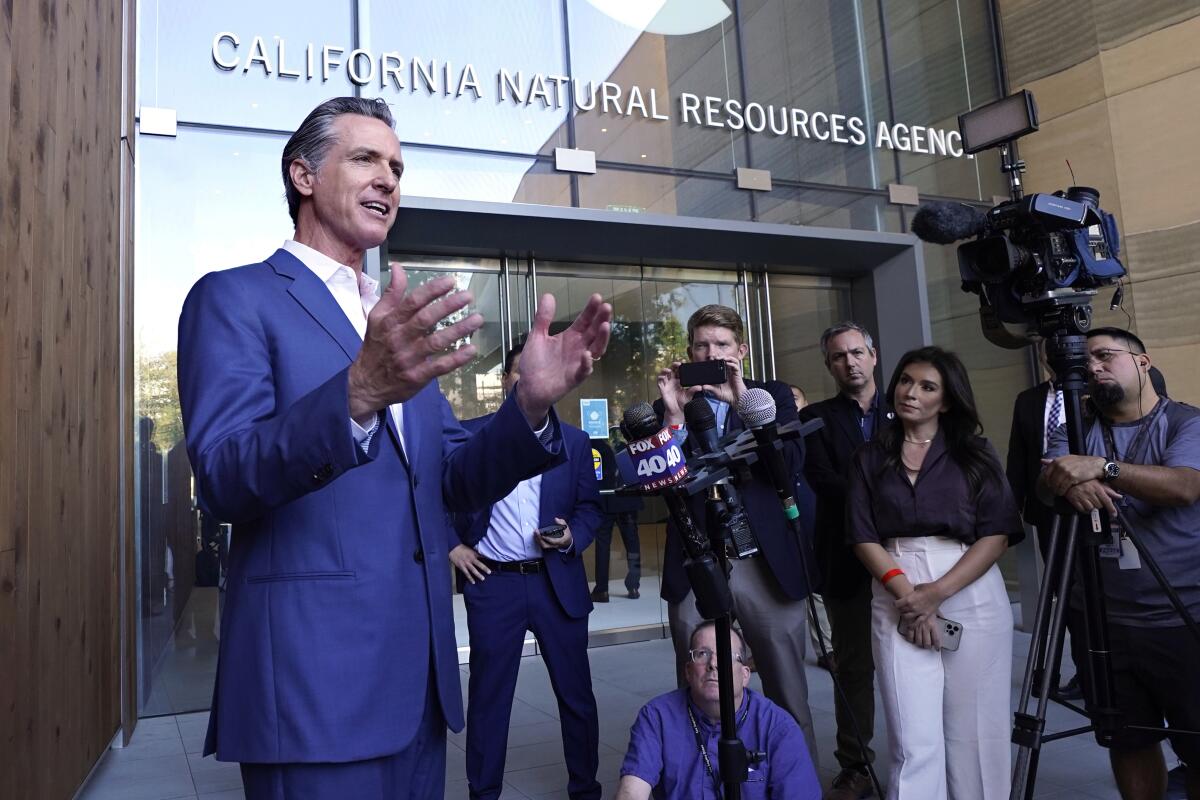Newsom threatens to call another special session on oil regulation

- Share via
SACRAMENTO — Gov. Gavin Newsom threatened to call a special session this fall as Democratic lawmakers wobbled on a package of energy bills that he wants to pass this week before the Legislature adjourns for the year, according to sources involved in the negotiations at the Capitol.
The governor delivered the last-minute ultimatum in private discussions with Assembly Speaker Robert Rivas (D-Hollister) and Senate President Pro Tem Mike McGuire (D-Healdsburg) this week as tension among Democrats escalated under a Saturday deadline to pass legislation.
The threat is intended to counter the pressure oil interests are putting on lawmakers to reject Newsom’s proposal to require petroleum refiners to maintain a stable inventory in order to prevent fuel shortages and price spikes when equipment is taken offline for maintenance.
The bill is part of a package on energy costs that the governor’s office has been negotiating with the Legislature. The governor is calling for legislation that would offer a customer credit for electricity and gas bills, accelerate environmental reviews for clean energy projects and require oil refiners to maintain reserves, among other proposals. Some environmentalists criticized the plan because of the push to expedite environmental reviews.
Mary Creasman, chief executive of California Environmental Voters, said the state must accelerate the development of clean energy and clean energy infrastructure, but needs to do so in a way that protects biodiversity and offers enough time for community engagement.
“Year after year trying to jam solutions to this through at the last minute is not how we tackle the toughest issues our state is facing in a powerful and effective way,” Creasman said.
A special session could force lawmakers to return to Sacramento this fall, instead of in January when the regular session begins, and shorten the time they have to spend with their families or to campaign for the election in their respective districts.
Sources involved in the discussions said Assembly Democrats in particular are concerned that adopting new requirements on oil refiners might ultimately increase the cost of gasoline. Rivas shared those reservations with Newsom, which prompted the threat of a special session to give lawmakers more time to weigh the proposal. The Assembly is prepared to embark on a special session if necessary, sources said.
Assemblymember Lori D. Wilson (D-Suisun City) said she and her colleagues are concerned about gas prices, but “we haven’t really had time to digest the problem.”
“The special session is a good opportunity to talk about it,” Wilson said outside the Assembly chamber. “We either have to accept policy as is or craft the new policy together. I think it’s a good thing.”
Other legislators seemed more neutral.
“It’s a coin flip,” said Assemblymember Marc Berman (D-Menlo Park). “I’m ambivalent. I understand the argument to get it done now and that some others want to slow the process down a little bit.”
The threat is not necessarily idle from a governor who called a special session two years ago to penalize oil companies for excessive profits as gasoline prices spiked during his war with Big Oil.
Lawmakers were ultimately reluctant to adopt a penalty in the last special session and Newsom refined his request to instead demand more transparency from the industry.
Instead of enacting a cap and penalty on oil refinery profits, Newsom and lawmakers gave state regulators the ability to do so in the future. Consumer advocates and the governor celebrated the resulting law as a groundbreaking tool that could keep gas prices from escalating.
The law established the Division of Petroleum Market Oversight within the California Energy Commission, and gave it the authority to gather new data from the industry in order to investigate price spikes. Earlier this year, the division wrote a letter recommending the state impose minimum inventory and resupply requirements for refiners based on its findings so far, arguing that the oil companies did not maintain enough refined gasoline to backfill production shortfalls or protect against the impact of unplanned maintenance.
Newsom continued his fight with oil last week when he announced that he wants lawmakers to give regulators the ability to mandate the new supply requirements for oil refiners.
“Price spikes at the pump are profit spikes for Big Oil,” Newsom said in a statement at the time. “Refiners should be required to plan ahead and backfill supplies to keep prices stable, instead of playing games to earn even more profits. By making refiners act responsibly and maintain a gas reserve, Californians would save money at the pump every year.”
As Newsom goes harder on refiners, he’s also sought to delay parts of an existing law in order to give the industry more time to submit plans for leak detection and response on existing wells. The proposed changes do not affect a prohibition on new permits for oil wells within 3,200 feet of homes, schools, parks and hospitals, which is the main thrust of the original law that took effect after oil interests agreed this year to remove a referendum on Senate Bill 1137 from the 2024 ballot.
H.D. Palmer, a spokesperson for the California Department of Finance, said the Newsom administration asked lawmakers to delay the new leak-detection plans to give the state more time to implement that part of the law. Current staffing levels, he said, “are insufficient to make rapid progress on the implementation of SB 1137.”
A budget trailer bill was published on Tuesday evening that could reflect a compromise between the governor, lawmakers and environmentalists on the delay.
The governor’s office and the Assembly Speaker’s Office declined to comment about the possibility of a special session. A spokesperson for McGuire did not immediately respond to a request for comment.
Times staff writer Anabel Sosa contributed to this report.
More to Read
Sign up for Essential California
The most important California stories and recommendations in your inbox every morning.
You may occasionally receive promotional content from the Los Angeles Times.











